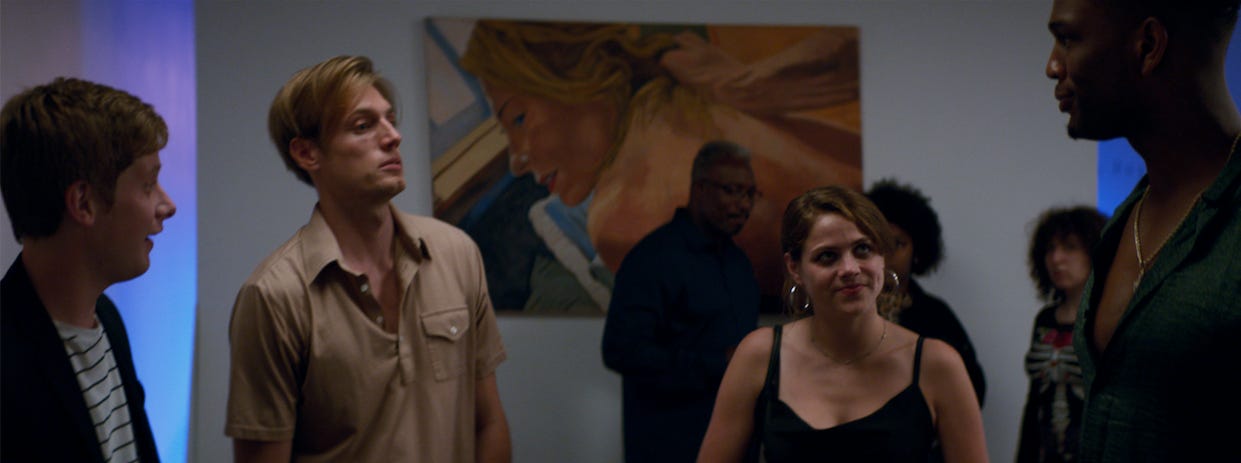Paint
Paint is about a trio of young artists living in NYC, who must navigate their work, their business, and themselves, while attempting to stay true to their own creative ideals. From school, they’ve set forth to an epicenter of civilization, only to struggle in adapting and compromising to this new world. This real world. As a critic of art, I can certainly see the promise of another coming of age movie about young bohemians - no matter if they’re naturals or wannabes - as these stories do tend to ring a bell with those of my ilk. But do excuse me if I experience another Art School Confidential headache, even if it’s ever so mild.
No, Art School Confidential wasn’t bad. It rubbed me the wrong way, yes, but I feel that this sensation was intended. That the film was built to annoy. And that, I can appreciate with a smile.
Paint isn’t annoying so much as it’s generally bland and mixed up. Here and there are moments of provocation and confrontation that could’ve forced some much-needed movement out of our three stuck-in-their-own-muds (forgive my maybe cuteness), but instead are left in as brief interludes that changed nothing. This, I can only tilt my head at with a frown.
Can it be turned right-side-up?
This is a movie hinged on its characters and their complications: A young man working on a project involving his mother; his friend, helping the project along but getting too close; and their female friend, dealing in self-sabotage and self-destruction. Paint has all of the makings for a classic drama of personal and inner conflicts, all interesting in their own ways. And the performances are pretty strong too, especially that of Olivia Luccardi, who pulls such harmful energy and unwieldy passion from her character Kelsey. While the film does get too oblong for its own good, her role alone pieces enough together around her to hold on well for the duration. We may end the story on Quinn, the ever-broke and self-righteous guy who the movie kind of picks as its zen center, but the spirit belongs to Luccardi’s Kelsey, the wild card always on edge but always wishing to do better and do right - if it wasn’t for the cycle she’s usually in.
Again, there is conflict and, with that, darkness. Paint may lose its flame one time too many, but it does know when to light the candle, and who to do it with. There is blandness, sure, but it’s never boring. One scene in particular, where a drug exchange gets too personal and too scary for one of the leads involved, cements this. The film has the ability to push buttons and generate conversation greatly, though following up is its main hurdle. Interestingly, as a whole, it has a lot in common with Kelsey’s personality.
A wonderful element, or a happy accident? Doesn’t matter. My frown has leveled out a bit. It’s ok.
Touch
No matter anyone’s opinion, once you’re the first at something, your name is written into history. Filmmaker Aleksandra Szczepanowska is the first Western woman to direct an independent film in China, and nobody can or should take that accomplishment away. Her latest film however - shot and set in China - Touch, comes very close to, at the very least, erasing critical goodwill, I’m afraid.
Szczepanowska performs behind and in front of the camera, as both director and as main character Fei Fei, a married woman in the midst of domestic drama. There is a sense of control that Szczepanowska weilds well across both roles, having to be in command of herself, her character, her movie, and everyone else. She clearly has strength in expression, playing her role with sad grace and desperate anxiety in many fits and bursts, and confidence in the story she’s responsible for as its creator. And her character Fei Fei, a western white woman wanting to become a permanent Chinese citizen, has a pretty unfamiliar and striking arc suggested. It’s in everything else where her film falls apart.
She plays a woman who’s torn between two men, her wealthy husband and her blind massuese. One provides her with a comfortable life, and the satisfies her more intimate wanting. Never does Touch go full sensual though. In fact, this is a mostly prudish film, tip-toeing around sensations associated with massage, physical contact, interactions, etc. We weave in and out of her double lives by way of a mostly wandering camera, shooting everything with an eye and ear for the moment its currently in. This style only works in a few instances, notably around the ending, where the story takes the hardest turn I’ve seen in quite some time. And the editing? Rough, as if cut with an old razor. Scenes end too soon, some too long, and sometimes we never know if what we’re seeing is literally happening or in proper sequence. This does sow doubt in our minds towards Fei Fei’s grasp on reality, but that may have been unintentional.
Indeed, there is a turn that happens with neck-breaking speed, tripping Touch from drama into horror most intensely. Expectations go out the window, and the film begins a freefall from which it doesn’t recover. All bets are off, and nothing afterward makes any sense. Tension? Lost. This genre swap has an unprecedented feeling to it, as I’m not sure I’ve witnessed anything like it in a movie before. Usually, there’s a tonal throughline that assists in transitioning from one track to the next, but Touch skips every beat and just does the dirty. Bold, but again it’s likely unintentional.
Technically, watching Touch was fun. It was never all that clear what was around the corner, it was progressively incoherent, and I could, without hesitation, press play again just to confirm it all. This doesn’t mean that it’ll go over the same way with anyone else, but I suspect most honest reactions won’t be too far off. Touch may not be good, but it is memorable. And for Szczepanowska, no critical goodwill should be taken away.
Seriously, I’m ready for her next efforts.
:)






